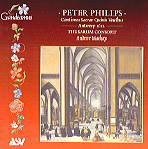This collection of motets by 16th/17th-century English composer Peter Philips adds to a justly (albeit slowly) growing discography that in every instance shows why Philips’ music deserves greater respect and recognition. Its quality goes beyond identifiable structural craftsmanship (an engaging mix of chordal style and polyphony) and melodic invention to include a special expressive character that arises from the composer’s sincere attention to texts–a quality similar to that found in works of other great but much better known composers of the period, such as Byrd, Tallis, and Gibbons. (According to the disc’s well-informed notes, in his lifetime Philips not only was highly regarded but also “had more compositions published than any Englishman except Byrd.”)
For this recording The Sarum Consort presents 18 selections drawn from the set of 69 five-part motets published in 1612, and the ensemble takes the scoring literally–that is, one voice to a part–and utilizes the continuo accompaniment that the composer added in 1617. The voices are close–intimate, you might say–and vibrantly recorded, which makes us appreciate the predominantly fine blend and usually precise intonation all the more. One of the sopranos occasionally penetrates a bit too much–it’s a pleasant enough voice but in this context there’s a fine line between judicious balance and dominance. You can hear clear examples of both in the six-minute-long miniature masterpiece O crux splendidior.
Each of three currently available discs devoted exclusively to Philips’ motets offers something unique. The Winchester Cathedral Choir recording from 1992 (Hyperion) includes a few of the five-part works (duplicating only two of the pieces on this disc) along with several more from Philips’ later collection of eight-part motets, all but one of which are performed with instruments–in contrast to The Tudor Consort’s purely a cappella renditions for Naxos (type Q4456 in Search Reviews) and the Sarum Consort’s versions with organ. Again, because Philips wrote nearly 100 of these motets, and their quality is uniformly high, there is little repetition of works on the three programs. If you enjoy the sacred music of Byrd and Tallis, you’ll find equal pleasure in these pieces, as presented on any–or all–of the abovementioned recordings.
































